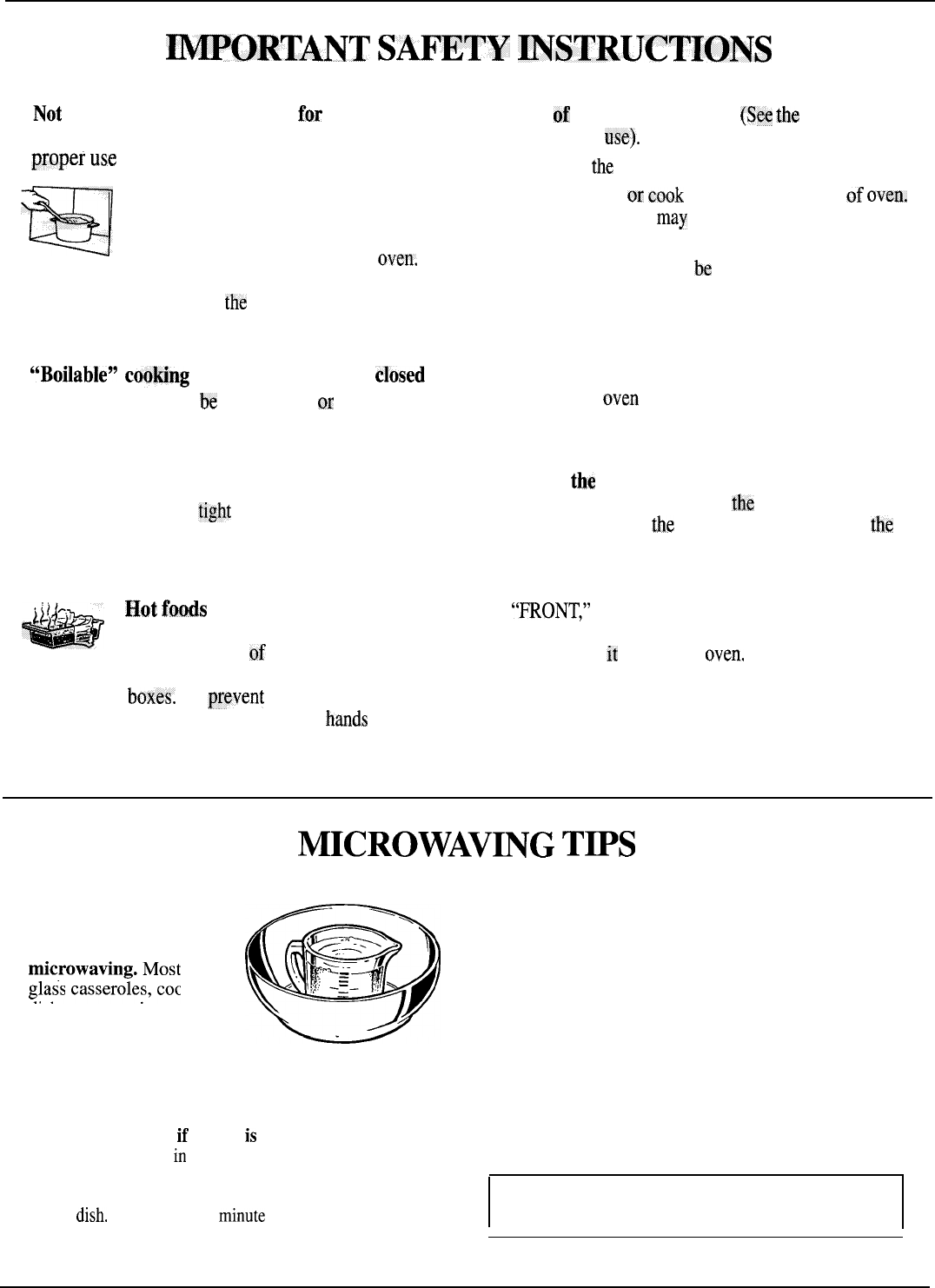
~ORTANT
SAFEm
~STRUCTIONS
(continued)
*
Not
all plastic
wrap is suitable
for
use in
* Use
of
the shelf accessory.
(See
the
Cookbook
microwave ovens.
Check the package for
for proper
use).
pr~per
use
—Remove
the
shelf from oven when not in use,
*Spontaneous boiling—Under certain
—Do not store
or
cook
with shelf on floor
of
oven,
special circumstances, liquids may
Product damage
may
result.
start to boil during or shortly after
—Use pot holders when handling the shelf and
removal from the microwave
oven.
To prevent bums from splashing
cookware. They may
be
hot.
liquid, stir
the
liquid briefly before
—Do not use microwave browning dish on shelf.
removing the container from the
The shelf could overheat.
microwave oven.
—Use the shelf only when cooking on two levels.
,
~4Boilab1e”
coo~ng
pouches and
tightly
closed
—Be sure that the shelf is positioned properly
plastic bags
should
be
slit, pierced
or
vented as
inside the
oven
to prevent product damage.
directed by package. If they are not, plastic could
—Do not use the broiler pan or spatter shield
burst during or immediately after cooking,
while microwaving.
possibly resulting in injury. Also, plastic storage
containers should beat least partially uncovered
. Use of
the
broiler pan—When inserting the
because they form a
tight
seal. When cooking
broiler pan, make sure that
the
two stop-locks
with containers tightly covered with plastic wrap,
on the bottom of
the
drip pan are inserted in
the
remove covering carefully and direct steam away
oven first so that these stop-locks properly lock
from hands and face.
the broiler pan onto the guides on the oven side
walls. When properly inserted, the word
●
Rot
foods
and steam can cause
“~ONT,” stamped into the bottom of the drip
burns. Be careful when opening
pan, will be towards the leading edge of the pan
any containers
of
hot food, including
as you pull
it
out of the
oven.
popcorn bags, cooking pouches and
boxes,
To
pr~vent
possible injury,
direct steam away from
hands
SAVE THESE
and face.
INSTRUCTIONS
MICROWAVmG
TWS
●
Make sure all cookware
used
in your microwave
oven is suitable for
G
‘nicrowavingMost
J
w
glass
casseroles, cooking
dishes, measuring cups,
custard cups, pottery or
china dinnerware which
does not have metallic trim or glaze with a metallic
sheen can be used. Some cookware is labeled “suitable
for microwaving. ”
●
If you are not sure
if
a dish
is
microwave-safe,
use this test: Place
in
the oven both the dish you are
testing and a glass measuring cup filled with one
cup of water—set the measuring cup either in or next
to the
dish.
Microwave 1
minute
at high. If the dish
heats, it should not be used for microwaving. If the
dish remains cool and only the water in the cup heats,
then the dish is microwave-safe.
●
Paper towels, waxed paper and plastic wrap
can be used to cover dishes in order to retain moisture
and prevent spattering. Be sure to vent plastic wrap so
steam can escape.
●
Some microwaved foods require stirring, rotating
or rearranging.
Check the Cookbook supplied.
●
Steam builds up pressure in foods which are tightly
covered by a skin or membrane.
Pierce potatoes, egg
yolks and chicken livers to prevent bursting.
If you use a meat thermometer while cooking, make
sure it is safe for use in microwave ovens.
6


















